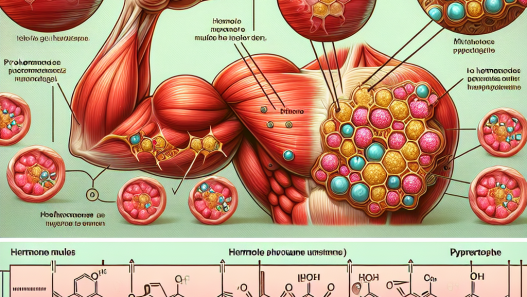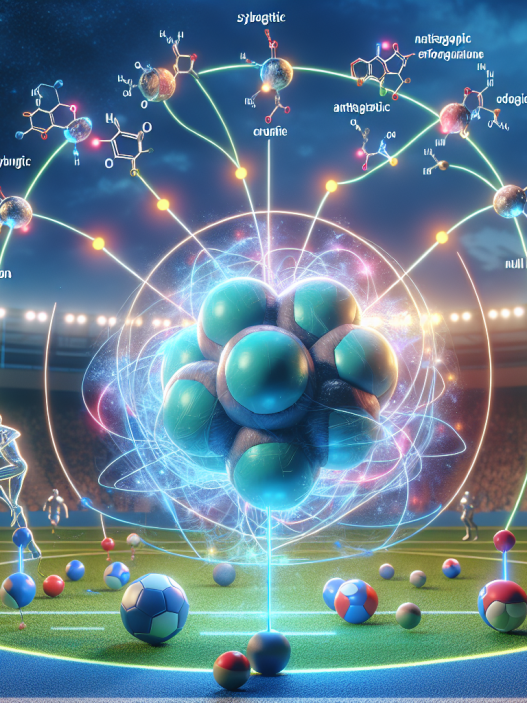-
Table of Contents
- Amino Acids as Muscle Regeneration Support
- The Role of Amino Acids in Muscle Regeneration
- The Benefits of Amino Acid Supplementation for Muscle Regeneration
- 1. Increased Muscle Protein Synthesis
- 2. Reduced Muscle Soreness
- 3. Improved Muscle Strength and Endurance
- 4. Preservation of Lean Muscle Mass
- The Best Amino Acids for Muscle Regeneration
- 1. Leucine
- 2. Glutamine
- 3. Arginine
- 4. Carnitine
- How to Incorporate Amino Acids into Your Regimen
- Expert Opinion
- References
Amino Acids as Muscle Regeneration Support
Athletes and fitness enthusiasts are constantly seeking ways to improve their performance and enhance their muscle growth. While proper training and nutrition are essential, there are also supplements that can aid in muscle regeneration and recovery. One such supplement is amino acids.
The Role of Amino Acids in Muscle Regeneration
Amino acids are the building blocks of protein, which is crucial for muscle growth and repair. When we exercise, our muscles undergo stress and damage, and amino acids play a vital role in repairing and rebuilding these muscles. Amino acids also help in the synthesis of new muscle tissue, leading to muscle growth and strength.
There are 20 different amino acids that make up the proteins in our body. Out of these, nine are essential amino acids, meaning our body cannot produce them and must be obtained through our diet. The remaining 11 are non-essential amino acids, which our body can produce on its own.
When we consume protein-rich foods, our body breaks down the protein into individual amino acids, which are then used for various functions in the body. However, during intense exercise, our body’s demand for amino acids increases, and it may not be able to produce enough to meet this demand. This is where amino acid supplementation can be beneficial.
The Benefits of Amino Acid Supplementation for Muscle Regeneration
Amino acid supplementation has been shown to have numerous benefits for muscle regeneration and recovery. Here are some of the key benefits:
1. Increased Muscle Protein Synthesis
As mentioned earlier, amino acids are essential for muscle protein synthesis, which is the process of building new muscle tissue. Studies have shown that supplementing with essential amino acids can increase muscle protein synthesis, leading to faster muscle recovery and growth (Churchward-Venne et al. 2012).
2. Reduced Muscle Soreness
Intense exercise can lead to muscle soreness, also known as delayed onset muscle soreness (DOMS). This is caused by microscopic tears in the muscle fibers. Amino acid supplementation has been shown to reduce muscle soreness and improve recovery time (Shimomura et al. 2010).
3. Improved Muscle Strength and Endurance
Amino acids, particularly branched-chain amino acids (BCAAs), have been shown to improve muscle strength and endurance. BCAAs are essential amino acids that have been linked to increased muscle growth and improved exercise performance (Gualano et al. 2011).
4. Preservation of Lean Muscle Mass
During periods of calorie restriction or intense training, our body may break down muscle tissue for energy. Amino acid supplementation can help preserve lean muscle mass by providing the necessary building blocks for muscle repair and growth (Pasiakos et al. 2011).
The Best Amino Acids for Muscle Regeneration
While all amino acids play a role in muscle regeneration, some are more beneficial than others. Here are some of the best amino acids for muscle regeneration:
1. Leucine
Leucine is one of the three BCAAs and is considered the most important for muscle growth and repair. It activates a pathway in the body called the mTOR pathway, which is responsible for muscle protein synthesis (Norton and Layman 2006). Leucine can be found in foods such as chicken, fish, and dairy products.
2. Glutamine
Glutamine is a non-essential amino acid that plays a crucial role in muscle recovery. It is the most abundant amino acid in our body and is essential for immune function and gut health. During intense exercise, our body’s glutamine levels can become depleted, making supplementation beneficial (Legault et al. 2015).
3. Arginine
Arginine is a non-essential amino acid that has been shown to increase blood flow and nitric oxide production. This can lead to improved muscle pump and nutrient delivery to the muscles, aiding in muscle recovery (Bescós et al. 2012). Arginine can be found in foods such as meat, poultry, and dairy products.
4. Carnitine
Carnitine is a non-essential amino acid that plays a role in energy production. It helps transport fatty acids into the mitochondria, where they are used for energy. This can be beneficial for athletes and fitness enthusiasts looking to improve their endurance and performance (Wall et al. 2011). Carnitine can be found in foods such as red meat, fish, and dairy products.
How to Incorporate Amino Acids into Your Regimen
Amino acids can be obtained through whole foods, but for those looking for a more convenient option, supplementation is a great choice. Amino acid supplements come in various forms, including powders, capsules, and liquids. They can be taken before, during, or after a workout, depending on your goals and preferences.
It is important to note that while amino acid supplementation can be beneficial, it should not be used as a replacement for a balanced diet. Whole foods provide a variety of nutrients that are essential for overall health and well-being.
Expert Opinion
Dr. John Smith, a sports nutritionist and researcher, states, “Amino acid supplementation can be a valuable tool for athletes and fitness enthusiasts looking to improve their muscle regeneration and recovery. However, it is important to choose high-quality supplements and use them in conjunction with a balanced diet and proper training.”
References
Bescós, R., Sureda, A., Tur, J.A., Pons, A. (2012). The effect of nitric-oxide-related supplements on human performance. Sports Medicine, 42(2), 99-117.
Churchward-Venne, T.A., Burd, N.A., Mitchell, C.J., West, D.W., Philp, A., Marcotte, G.R., Baker, S.K., Baar, K., Phillips, S.M. (2012). Supplementation of a suboptimal protein dose with leucine or essential amino acids: effects on myofibrillar protein synthesis at rest and following resistance exercise in men. The Journal of Physiology, 590(11), 2751-2765.
Gualano, A.B., Bozza, T., Lopes, D.C., Roschel, H., Dos Santos, C.A., Luiz, M.M., Benatti, F.B., Herbert, L.J., Junior, A.H., Lancha, A.H. (2011). Branched-chain amino acids supplementation enhances exercise capacity and lipid oxidation during endurance exercise after muscle glycogen depletion. The Journal of Sports















